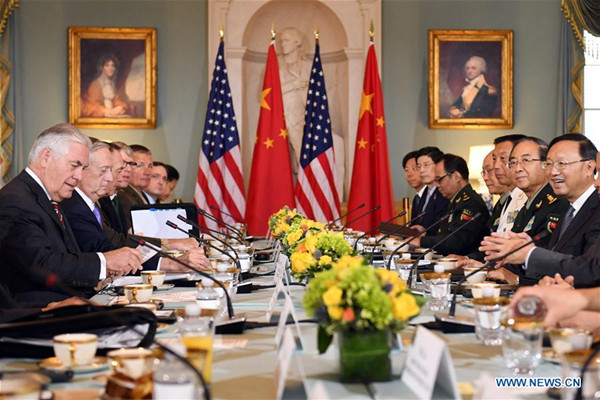 Chinese State Councilor Yang Jiechi (1st R) co-chairs a diplomatic and security dialogue with U.S. Secretary of State Rex Tillerson (1st L) and Secretary of Defense James Mattis (2nd L) as Fang Fenghui (2nd R), a member of China's Central Military Commission (CMC) and chief of the CMC Joint Staff Department, also participates in the dialogue in Washington D.C., the United States, on June 21, 2017. China and the United States began their first diplomatic and security dialogue on Wednesday at the U.S. State Department in Washington D.C. (Xinhua/Yin bogu) China and the United States reached an important consensus on the development of bilateral relations and security issues at a high-level dialogue held Wednesday in the U.S. capital of Washington D.C.. The First Round of China-U.S. Diplomatic and Security Dialogue, which was described by both sides as "constructive" and "fruitful," represents a major step in implementing the consensus reached by Chinese President Xi Jinping and his U.S. counterpart Donald Trump during their meeting in Florida in April. Looking ahead, the two sides pledged to expand mutually-beneficial cooperation and manage differences on the basis of mutual respect, all in a bid to promote the steady development of China-U.S. relations in the long term. FREQUENT DIALOGUES Following Wednesday's dialogue, U.S. Secretary of State Rex Tillerson said such talks "provide an opportunity to consider how we're going to engage and how we're going to live with one another over the next 40 years. "The action items we have agreed upon today have set a foundation for additional areas of cooperation and we look forward to our next interaction at this level and between our two presidents," said the top U.S. diplomat. Emphasizing the importance of high-level exchanges, China and the United States expressed their willingness to achieve a positive outcome for the Hamburg meeting between the two Presidents in July and Trump's state visit to China later this year. Meeting with Chinese State Councilor Yang Jiechi at the White House on Thursday, Trump said he looked forward to meeting with Xi in Hamburg and visiting China. He also hoped that these high-level interactions will further promote the development of U.S.-China relations. PRODUCTIVE MILITARY RELATIONSHIP Fang Fenghui, a member of China's Central Military Commission (CMC) and chief of the CMC Joint Staff Department, participated in the dialogue co-chaired by Yang, Tillerson and U.S. Secretary of Defense James Mattis. At the dialogue, China and the United States recognized that their military-to-military relationship is an important component in the bilateral ties. The two sides agreed that the relationship between the militaries of the two powers should be "constructive, pragmatic, and effective," according to a statement released Friday. China and the United States are committed to implementing the annual military exchange program and enhancing high-level engagements, starting with the visits between the two defense ministers and the visit of the Chairman of the U.S. Joint Chiefs of Staff to China as soon as possible. The two sides also "reaffirm the importance of building mutual understanding, and of reducing the risk of miscalculation between our two militaries," said the statement. MAINTAINING COORDINATION ON KOREAN PENINSULAR ISSUE At the dialogue, China the United States agreed to work closely on the Korean Peninsula's nuclear issue. Both countries reaffirmed their commitment to achieving the goal of "complete, verifiable and irreversible" denuclearization on the Peninsula. "The two sides are ready to continue their efforts to this end, including by fully and strictly implementing relevant United Nations Security Council resolutions, and by promoting relevant dialogue and negotiation," said the statement. The two countries also reaffirmed their commitment to maintaining peace and stability on the Peninsula, according to the statement. |